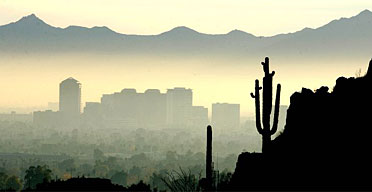<font size="5"><center>Climate Experts Worry as
2006 Is Hottest Year on Record in U.S.</font size></center>
By Marc Kaufman
Washington Post Staff Writer
Wednesday, January 10, 2007; Page A01
Last year was the warmest in the continental United States in the past 112 years -- capping a nine-year warming streak "unprecedented in the historical record" that was driven in part by the burning of fossil fuels, the government reported yesterday.
According to the government's National Climatic Data Center, the record-breaking warmth -- which caused daffodils and cherry trees to bloom throughout the East on New Year's Day -- was the result of both unusual regional weather patterns and the long-term effects of the buildup of carbon dioxide in the atmosphere.
"People should be concerned about what we are doing to the climate," said Jay Lawrimore, chief of the climate monitoring branch of the National Oceanic and Atmospheric Administration. "Burning of fossil fuels is causing an increase in greenhouse gases, and there's a broad scientific consensus that is producing climate change."
The center said there are indications that the rate at which global temperatures are rising is speeding up.
Average temperatures nationwide in 2006 were 2.2 degrees Fahrenheit higher than the mean temperatures nationwide for the 20th century, the agency said. It reported that seven months in 2006 were much warmer than average, and that last month was the fourth-warmest December on record. Average temperatures for all 48 contiguous states were above or well above average, and New Jersey logged its hottest temperatures ever.
Many researchers are concerned that rising temperatures could lead to widespread melting of the polar ice caps, resulting in higher sea levels and more extreme droughts and storms. But NOAA also pointed to one silver lining: The unusually warm temperatures from October to December helped keep residential energy use for heating 13.5 percent below the average for that period.
NOAA said an El Ni?o weather pattern in the equatorial Pacific also contributed to the warm temperatures by blocking cold Arctic air from moving south and east across the nation.
Climate experts generally do not make much of temperature fluctuations over one or two years, but Lawrimore said the record 2006 temperatures were part of a long and worrisome trend. For instance, NOAA said, the past nine years have all been among the 25 warmest years on record for the continental United States.
Advocates for more action to control carbon dioxide emissions also voiced concern.
"No one should be surprised that 2006 is the hottest year on record for the U.S.," said Brenda Ekwurzel, a climate scientist with the Union of Concerned Scientists, a public interest group. "When you look at temperatures across the globe, every single year since 1993 has been in the top 20 warmest years on record."
"Realistically, we have to start fighting global warming in the next 10 years if we want to secure a safe environment for our children and grandchildren," she said.
Lawrimore said other NOAA research has found that the rate of temperature increase has been significantly greater in the past 30 years than at any time since the government started collecting national temperature data in 1895. Globally, 2005 was the hottest year on record, Lawrimore said, and 2006 was slightly cooler.
He said that although there is a scientific consensus that carbon dioxide from cars, power plants and factories is leading to global warming, there is no consensus yet on whether the warming will increase more quickly or more slowly in the future. Some researcher have predicted that temperatures worldwide will increase by a catastrophic 7 to 8 degrees on average by the end of the century, while others project an increase of a more modest 2 degrees by century's end.
The burning of oil and other fossil fuels releases carbon dioxide, which rises, blankets the Earth and traps heat. Climate scientists report that there has not been this much carbon dioxide in the atmosphere in the past 650,000 years.
The Bush administration has rejected proposals to cap carbon dioxide emissions or impose carbon taxes as a way to limit global warming. Lawrimore said he believes the problem could and should be addressed by developing new technologies for powering vehicles and industry.
Late December's springlike temperatures in the eastern two-thirds of the country made it the fourth-warmest December on record in the United States and contributed greatly to the record high for the year. Several Northern cities were unusually warm -- with Boston 8 degrees above average and Minneapolis-St. Paul 17 degrees above average for the last three weeks of the month.
http://www.washingtonpost.com/wp-dyn/content/article/2007/01/09/AR2007010901949.html
2006 Is Hottest Year on Record in U.S.</font size></center>
By Marc Kaufman
Washington Post Staff Writer
Wednesday, January 10, 2007; Page A01
Last year was the warmest in the continental United States in the past 112 years -- capping a nine-year warming streak "unprecedented in the historical record" that was driven in part by the burning of fossil fuels, the government reported yesterday.
According to the government's National Climatic Data Center, the record-breaking warmth -- which caused daffodils and cherry trees to bloom throughout the East on New Year's Day -- was the result of both unusual regional weather patterns and the long-term effects of the buildup of carbon dioxide in the atmosphere.
"People should be concerned about what we are doing to the climate," said Jay Lawrimore, chief of the climate monitoring branch of the National Oceanic and Atmospheric Administration. "Burning of fossil fuels is causing an increase in greenhouse gases, and there's a broad scientific consensus that is producing climate change."
The center said there are indications that the rate at which global temperatures are rising is speeding up.
Average temperatures nationwide in 2006 were 2.2 degrees Fahrenheit higher than the mean temperatures nationwide for the 20th century, the agency said. It reported that seven months in 2006 were much warmer than average, and that last month was the fourth-warmest December on record. Average temperatures for all 48 contiguous states were above or well above average, and New Jersey logged its hottest temperatures ever.
Many researchers are concerned that rising temperatures could lead to widespread melting of the polar ice caps, resulting in higher sea levels and more extreme droughts and storms. But NOAA also pointed to one silver lining: The unusually warm temperatures from October to December helped keep residential energy use for heating 13.5 percent below the average for that period.
NOAA said an El Ni?o weather pattern in the equatorial Pacific also contributed to the warm temperatures by blocking cold Arctic air from moving south and east across the nation.
Climate experts generally do not make much of temperature fluctuations over one or two years, but Lawrimore said the record 2006 temperatures were part of a long and worrisome trend. For instance, NOAA said, the past nine years have all been among the 25 warmest years on record for the continental United States.
Advocates for more action to control carbon dioxide emissions also voiced concern.
"No one should be surprised that 2006 is the hottest year on record for the U.S.," said Brenda Ekwurzel, a climate scientist with the Union of Concerned Scientists, a public interest group. "When you look at temperatures across the globe, every single year since 1993 has been in the top 20 warmest years on record."
"Realistically, we have to start fighting global warming in the next 10 years if we want to secure a safe environment for our children and grandchildren," she said.
Lawrimore said other NOAA research has found that the rate of temperature increase has been significantly greater in the past 30 years than at any time since the government started collecting national temperature data in 1895. Globally, 2005 was the hottest year on record, Lawrimore said, and 2006 was slightly cooler.
He said that although there is a scientific consensus that carbon dioxide from cars, power plants and factories is leading to global warming, there is no consensus yet on whether the warming will increase more quickly or more slowly in the future. Some researcher have predicted that temperatures worldwide will increase by a catastrophic 7 to 8 degrees on average by the end of the century, while others project an increase of a more modest 2 degrees by century's end.
The burning of oil and other fossil fuels releases carbon dioxide, which rises, blankets the Earth and traps heat. Climate scientists report that there has not been this much carbon dioxide in the atmosphere in the past 650,000 years.
The Bush administration has rejected proposals to cap carbon dioxide emissions or impose carbon taxes as a way to limit global warming. Lawrimore said he believes the problem could and should be addressed by developing new technologies for powering vehicles and industry.
Late December's springlike temperatures in the eastern two-thirds of the country made it the fourth-warmest December on record in the United States and contributed greatly to the record high for the year. Several Northern cities were unusually warm -- with Boston 8 degrees above average and Minneapolis-St. Paul 17 degrees above average for the last three weeks of the month.
http://www.washingtonpost.com/wp-dyn/content/article/2007/01/09/AR2007010901949.html
Last edited:





